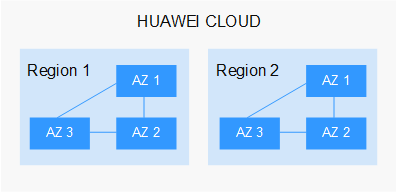How Do I Select a Region and an AZ?
Concepts
We use a region and an availability zone (AZ) to identify the location of a data center. You can create resources in a specific region and AZ.
- Regions are divided from the dimensions of geographical location and network latency. Public services, such as Elastic Cloud Server (ECS), Elastic Volume Service (EVS), Object Storage Service (OBS), Virtual Private Cloud (VPC), Elastic IP (EIP), and Image Management Service (IMS), are shared within the same region. Regions are classified as universal regions and dedicated regions. A universal region provides universal cloud services for common tenants. A dedicated region provides services of the same type only or for specific tenants.
- An AZ is a physical location using independent power supplies and networks. Faults in an AZ do not affect other AZs. A region can contain multiple AZs, which are physically isolated but interconnected through internal networks. This ensures the independence of AZs and provides low-cost and low-latency network connections.
Figure 1 shows the relationship between the regions and AZs.
Region Selection
- Location
Select a region close to you or your target users. This reduces network latency and accelerates access.
- Relationship between cloud services
Cloud services in different regions cannot communicate with each other through an internal network.
For example, if you want to enable communication between DataArts Studio (containing modules such as Management Center and CDM) and services in other regions (such as MRS and OBS), use a public network or Direct Connect. If DataArts Studio and the other services are in the same region, instances in the same subnet and security group can communicate with each other by default.
- Resource price
AZ Selection
AZ to which the CDM cluster in the DataArts Studio instance belongs. The DataArts Studio instance communicates with other services through the CDM cluster.
- If your application requires good DR capability, deploy resources in different AZs in the same region.
- If your application requires a low network latency between instances, deploy resources in the same AZ.
Regions and Endpoints
An endpoint is the request address for calling an API. Endpoints vary depending on services and regions. You can obtain the endpoints of the service from Endpoints.
Feedback
Was this page helpful?
Provide feedbackThank you very much for your feedback. We will continue working to improve the documentation.







